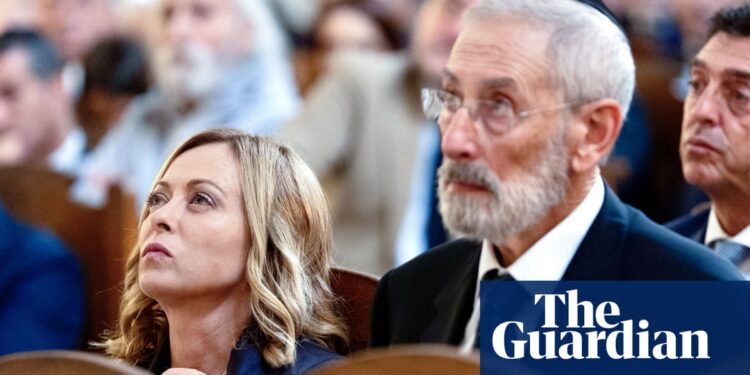World leaders, governments and individuals around the globe are marking the first anniversary of the 7 October terror attack launched by Hamas on Israel, with commemorations ranging from official statements to formal ceremonies and small private vigils.
The attack killed nearly 1,200 people, according to Israeli government figures, including hundreds at a music festival taking place in Re’im near the Israel-Gaza border. Militants also took about 250 hostages back to Gaza.
The Israeli offensive into Gaza it triggered has since killed nearly 42,000 people, most of them civilians, and injured almost 97,000, according to health authorities. The conflict has over the last year widened into a regional crisis involving Lebanon, where Israel is conducting heavy airstrikes nearly a year after Hezbollah militants began an exchange of fire, Iran and Yemen’s Houthi rebels.
“The 7 October attack scarred souls,” said UN secretary general, António Guterres. “On this day, we remember all those who were brutally killed and suffered unspeakable violence – including sexual violence – as they were simply living their lives.”
Guterres said Monday was “a day for the global community to repeat in the loudest voice our utter condemnation of the abhorrent acts of Hamas, including the taking of hostages”, who must be released “immediately and unconditionally”.
He added that the “wave of shocking violence and bloodshed” that has since erupted “continues to shatter lives and inflict profound human suffering for Palestinians in Gaza, and now the people of Lebanon” and it was “time to stop the suffering”.
Pope Francis said “the fuse of hatred” had been lit a year ago and “exploded in a spiral of violence – in the shameful inability of the international community and the most powerful countries to silence the weapons and put an end to the tragedy of war”.
In the US, President Joe Biden condemned the “unspeakable brutality” of the attack, paid tribute to the people – including American citizens – killed and kidnapped and said he remained committed to Israel’s right to defend itself a year on.
“I believe that history will also remember 7 October as a dark day for the Palestinian people because of the conflict that Hamas unleashed that day,” Biden said, adding: “Far too many civilians have suffered far too much during this year of conflict.”
Vice-president Kamala Harris said she was “heartbroken over the scale of death and destruction in Gaza over the past year” and it was “far past time for a hostage and ceasefire deal to end the suffering of innocent people.”
The White House was scheduled to hold a vigil for the Israeli hostages, while the Republican presidential hopeful, Donald Trump, was due to mark the anniversary at a remembrance event in Miami organised by Jewish community leaders.
In Germany, the chancellery in Berlin was draped with a yellow ribbon commemorating the Israeli hostages taken by Hamas and the names of the people killed and kidnapped in the attack were read out in front of the Brandenburg Gate.
Chancellor Olaf Scholz said his country stood by Israel’s side. “We feel with you the horror, the pain, the uncertainty and the sadness … The Hamas terrorists must be fought,” the German chancellor said.
Scholz, who was to attend a memorial event at a Hamburg synagogue, also drew attention to the suffering of Palestinians in Gaza, saying people “need hope and perspectives if they are to renounce terror”. Berlin “is calling for a ceasefire, for the hostages to be freed, and for a political process”, he said.
Emmanuel Macron said on social media that “the pain remains, as vivid as it was a year ago. The pain of the Israeli people. Ours. The pain of wounded humanity. We do not forget the victims, the hostages, or the families.”
More than 40 French citizens were killed in the 7 October attack. The French president met the families of French hostages in Gaza on Monday before an official evening ceremony to be attended by about 4,000 people, including the prime minister, Michel Barnier.
Keir Starmer said: “One year on from these horrific attacks, we must unequivocally stand with the Jewish community and unite as a country.”
Britain’s prime minister added: “On this day of pain and sorrow, we honour those we lost, and continue in our determination to return those still held hostage, help those who are suffering, and secure a better future for the Middle East.”
Giorgia Meloni, paid tribute in a speech during a ceremony at the Great Synagogue in central Rome to the victims of the “inhumane aggression perpetrated a year ago by Hamas”.
Remembering and condemning the attack was “not a mere ritual, but the prerequisite for any political action to restore peace in the Middle East”, the Italian prime minister said, adding that the “reticence increasingly encountered in doing so betrays a latent and rampant antisemitism that must concern everyone”.
The Spanish government said in a statement that it “reiterates its most vehement condemnation of the atrocious Hamas terrorist attacks” and expresses its solidarity with the relatives of the hostages who remain in captivity”.
Madrid called for “a ceasefire, the release of hostages, access for humanitarian aid … and an end to violence”, pledging to continue working for “peace in the Middle East and advancing the solution of two states living sideby side in peace and security”.
Commemorations were also planned in Belgium, Austria and Hungary, while in Brussels, European Commission president Ursula von der Leyen was attending a ceremony at a central synagogue.
In Australia, the prime minister, Anthony Albanese, attended a vigil in Melbourne, with members of the Jewish community and lawmakers from across party lines. The day carried “terrible pain”, Albanese said, condemning “all prejudice and hatred”.
Pro-Palestinian events also took place in many countries, with hundreds gathering amid a heavy police presence at Sydney town hall to attend a vigil for Palestinian lives lost, and a rally in Pakistan’s largest city, Karachi, to protest against Israeli airstrikes.
Reuters and Agence France-Presse contributed to this report






